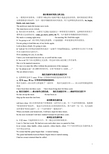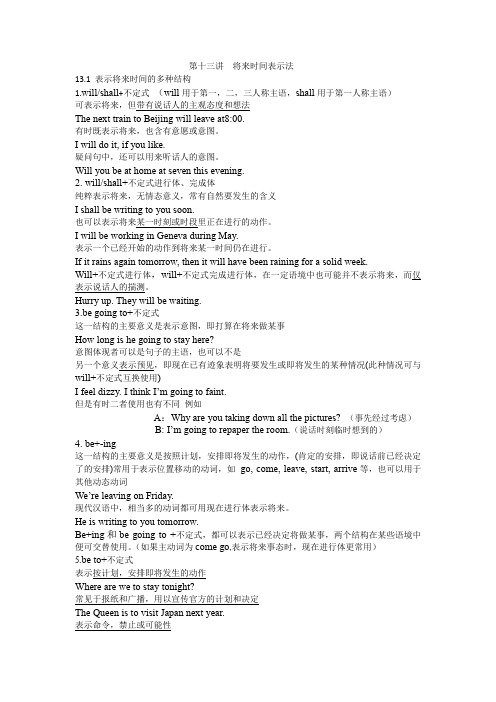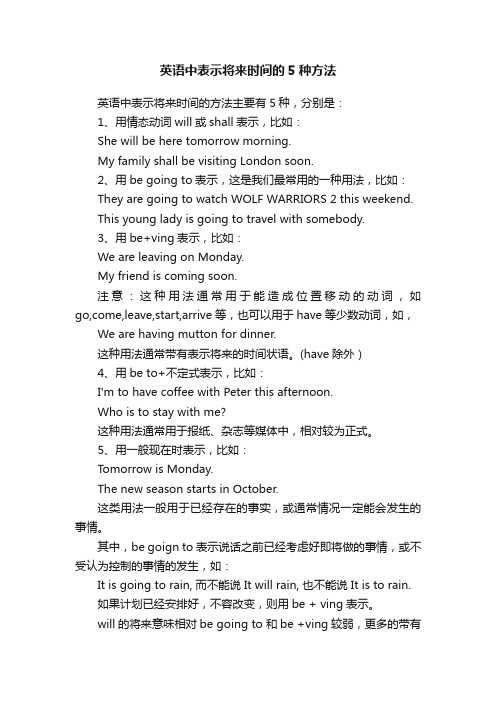第13讲 将来时间表示法
表示将来时间的几种方法

表示将来时间的几种方法:1.一般现在时表将来,主要用于确定的计划或不随主观意志而改变的,按时刻表或日程表安排将要进行的动作。
句中一般有明确的将来时间状语。
用于这种情况的动词有:be, begin, finish, end, start, learnThe professor starts his lecture next week.The train leaves at six o'clock.2. 现在进行时表将来,主要用于近期计划或表示一种即将发生的情形。
这种情形常常用于那些表示运动的动词:come, go, leave, arrive, fly等。
句中通常有明确的将来时间状语。
My uncle is coming right away. I'm meeting Mr. Drell this night.3. “be going to do"表示事先考虑过的意图,计划或根据一些客观事实所作的预见。
I'm not going to lend him any of my books again.Look at these clouds. It's going to rain.4. "will do"表示对事态发展的预见或在一定条件下的意图或意志;这种情形可以用于行有条件从句或时间从句的句中。
I'll fo anything for you, if you like.Unless you work hard from now on, or you'll fail the exam.5. "be to do"用于表示近期的正式安排,传达命令指示或分配工作任务等。
She is to be married tomorrow.No one is to enter the office without the permission of the manager.6. " be about to do" 表示瞬时将来时间,以为“顷刻或马上就要……"The are about to leave.现在完成时与现在完成进行时1. 这两种时态在与since 和for 引导的时间状语连用时有所不同A. 在与since 和for 引导的时间状语连词时:现在完成时---表示动作已经延续了一段时间现在完成进行时——表示动作将要延伸到将来I have been here for three years. I have been living here for three years.B. 现在完成时——表示动作已经完成。
将来时间表示法

表示一般将来时间的结构
will/shall + do
意图;预见
will/shall+be doing
纯将来;将来进行
Will/shall+have done
将来完成
will/shall + do VSbe going to do
will/shall + do:当事人认为会发生,临时想到的‘意图’;
be going to do:有迹象标明会发生,事先考虑过的‘意图’
be going to do VSbe doing
be going to do:已考虑过的意图,主观的、随时可以改变;
be doing:肯定的安排,不容改变,甚至不顾当事人的意图
be to do
官方消息(报纸、新闻),命令、禁止、可能性;用于正式语体
过去将来完成
was/were doing
与be doing类似
was/were going to do
与be going to do类似;没有实现的意图
was/were to do
表示过去将来的安排,不可避免要发生的事情;安排未执行则用was/were to have done
was/were about to
present tense
用于条件、时间状语分句;按既定日程一定会发生
be about to
‘即将’,通常不用表示将来的时间状语
表示过去将来时间的结构
would do
Байду номын сангаас用于从属分句
would be doing
过去进行;过去将来与will/shall + be doing相同
would have done
将来时的常见表达法

JU□山东朱秀兰一般将来时表示将来要发生的动作或存在的状态,即表示将来时间。
常见的将来时间状语有:tomorrow,the day after tomorrow,tomorrow morning/ afternoon/evening;in2014,in two days;next week/Sunday/month/term/year;this Monday/week/month/year;in a minute/moment;at once;today;in the future, soon,some day,one day;before long等。
1.M be going to+动词原形”。
be要根据主语人称和数的需要转换为is,am或are o此结构表示将要发生的事情或打算、计划、决定在最近或将来要做的事;也可以表示主观意愿,即表示事先经过考虑之后做出的计划或安排。
例如:Miss Li is going to be a doctor in the future.李小姐将来想当医生。
They have bought some cloth,they are going to make themselves coats.他彳f]买了些布料,准备自己做外套。
I'm going to leave for Canada next year.我计划明年去加拿大。
He's going to reach America in a few hours.几个小时后他将到达美国。
“be going to+动词原形”表示根据已有的迹象判断要发生的某种事态。
这种场合往往不需要有时间状语与之连用。
例如:Be careful!You are going to run into the tree.小心!你快要撞到树上了。
Look at the dark clouds.It is going to rain.看这乌云,像是要下雨了。
将来时表示法

第十三讲将来时间表示法13.1 表示将来时间的多种结构1.will/shall+不定式(will用于第一,二,三人称主语,shall用于第一人称主语)可表示将来,但带有说话人的主观态度和想法The next train to Beijing will leave at8:00.有时既表示将来,也含有意愿或意图。
I will do it, if you like.疑问句中,还可以用来听话人的意图。
Will you be at home at seven this evening.2. will/shall+不定式进行体、完成体纯粹表示将来,无情态意义,常有自然要发生的含义I shall be writing to you soon.也可以表示将来某一时刻或时段里正在进行的动作。
I will be working in Geneva during May.表示一个已经开始的动作到将来某一时间仍在进行。
If it rains again tomorrow, then it will have been raining for a solid week.Will+不定式进行体,will+不定式完成进行体,在一定语境中也可能并不表示将来,而仅表示说话人的揣测。
Hurry up. They will be waiting.3.be going to+不定式这一结构的主要意义是表示意图,即打算在将来做某事How long is he going to stay here?意图体现者可以是句子的主语,也可以不是另一个意义表示预见,即现在已有迹象表明将要发生或即将发生的某种情况(此种情况可与will+不定式互换使用)I feel dizzy. I think I’m going to faint.但是有时二者使用也有不同例如A:Why are you taking down all the pictures?(事先经过考虑)B: I’m going to repaper the room.(说话时刻临时想到的)4. be+-ing这一结构的主要意义是按照计划,安排即将发生的动作,(肯定的安排,即说话前已经决定了的安排)常用于表示位置移动的动词,如go, come, leave, start, arrive等,也可以用于其他动态动词We’re leaving on Friday.现代汉语中,相当多的动词都可用现在进行体表示将来。
将来时的六种表示法

一般将来时的六种表示法一、will/shallwill/shall通常用来表示将来时间。
Will用于第一、二、三人称主语,shall用于第一人称主语,都可以表示将来时,但是这种意义通常夹杂着情态意义,即带有说话人的主观态度和看法,比如表示“预见”:You will feel better if you after taking this medicine.He won’t be here in time unless he comes by air.We shall know the result next week.I am sure that I shall not lose my way in the woods.有时候表示将来,也含有“意愿”或“意图”I will do it if you like it.As the railway is not yet open to traffic, we shall go by boat.I promised to pay him back in time, but he won’t lend it to me.二、be going to这一结构的主要意义,一是表示“意图”,即打算在将来做什么。
Are you going to post that letter by air mail?How long is he going to stay here? 由于没有语境的限制,也可以换成will。
We’re going to call a meeting to discuss it.意图的体现者通常是句子的主语,但也有可能不是。
如:He’s not going to cheat me again.(=I won’t let him cheat me again.)二是表示“预见”,即现在已有的迹象表明将要或即将发生某种情况。
如:I feel dizzy. I think I am going to faint.Good heavens! I must hurry. I’m going to be late.Look at that black clouds——there is going to be a storm.表“意图”的用法有时候可以与“will+do”互换使用,但是也要注意区分。
将来时的六种表达法

将来时的六种表达法1.will/ shall do (will可用于第一、二、三人称,shall只用于第一人称)(1) 这种将来意义常常夹杂着情态意义,即带有说话人的主观态度和看法。
You will fail the test if you don’t work hard.(2) 有时既表示将来,也含有“意愿〞或“意图〞。
e.g. I will meet you at 6 o’clock.(3) 在疑问句中will/ shall还可用来征询听话人的“意图〞。
e.g. Will you be at home at seven this eveninge.g. --- Will you marry me --- Yes, I will.特别提示:1).will 可表示根据当时的情况,临时所做的打算。
e.g.-----Mr. Wang is ill in hospital. ----Oh, I’ll go and see him.e.g.-----Did you tell Julia about the result----- Oh,no,I forget.I_____ her nowA.will be callingB. will callC. callD. am to call2.)表单纯将来的will通常不用于时间,条件,让步状语从句,而是用一般现在时代替。
If 引导的条件状语从句中使用will不表将来,而表意愿。
e.g.I’ll tell him the truth if I see him tomorrow.e.g.1.If you will listen to me, I’ll tell you the truth. 2. If you __ for another ten minutes,Mr Brown will be here.A.will waitB.are going to waitC.are about to waitD.are waiting3) won’t 可表示拒绝做某事,用于物时,好似无生命的物体有了意志力。
将来时间的七种表示法

将来时间的七种表示法撰稿:张瑞安-越来越多的现代权威英语语法家认为,传统英语语法将动词划分为十六种时态既复杂又不严密,学习和使用起来都有一定的难度,进而提出了“两时两体”的新观点并逐渐被众多学者所接受。
“两时”即“现在时”和“过去时”。
“两体”为“进行体”和“完成体。
”这样一来,原来的“将来时”就无一席之地了。
这也难怪。
因为不论是“两时”还是“两体”,英语动词都有一定的形态变化来表示,唯有“将来时”没有。
换言之,许多种动词形态都可以用来表示“将来时间”。
以现行部分中学英语课本和《新编英语语法》为据。
以下七种形式都可以用来表示将来时间。
一、用助动词will /shall表示将来时间在传统语法中,这是将来时的主要表示法,shall用于第一人称,will用于二、三人称。
现代英语的发展趋势是will逐渐取代shall,可以用于各种人称。
1. I shall write you a letter next month. (P102, JB3)2. What shall we do in our English class tomorrow? (P1 ,JB4)3. Will she come home this afternoon? Yes, she will.(P96, JB3)4. Will you be busy tomorrow, Dad? No ,I won’t.(同上)5.We won’t have a meeting next Saturday. (P102 ,JB3)二、用be going to +不定式表示将来时间这一表示法比较口语化,通常表示近期内打算做什么或将要发生某事。
1. We are going to have a new subject this year.(P6, JB3)2. What are you going to do next Sunday? (同上)3.It’s going to rain this afternoon. (P6 ,JB3)4.Is there going to be a meeting this Friday? (P283 ,《新编》)三、用be trying to+不定式表示将来时间在美国口语中,用be trying to表示将来时间,强调主观意愿。
初中语法一般将来时

般将来时主要用来描述将要发生的动作或存在于未来的情况。
这里所说的“将来时间” 是指“说话、写文章那一刻以后的时间”。
它的表示方法主要有如下几种:1) shall / will + 动词原形这种表示方法是说,动作在现在或目前还未发生,要在将来的某个时间内发生;它没有主观性,是“纯粹的将来动作”。
例如:I shall / will not be free tomorrow . 我明天没空。
He will arrive here this evening . 他今晚抵达这里。
2) be( am / is / are ) + going + 不定式这种表示方法主要是说明A) “说话人的意图、打算” ;B) “某种可能性”。
例如:A) He is going to spend his holidays in London . 他打算在伦敦度假。
Who is going to speak first? 谁先发言?B) It is going to rain soon . 马上要下雨了。
Is he going to collect any data for us? 他会帮我们收集资料吗?If you go to New Zealand, you are going to like the place. 如果你去新西兰,你会喜欢上那个地方的。
3) be( am / is / are ) + 不定式表示方法描述两钟情况:按计划安排要发生的动作,这个动作发生的时间一般不会很远;要求或命令他人做某事。
例如:A) The new bridge is to open to traffic in three days. 新桥三天后通车。
The factory is to go into production before National Day. 这家工厂国庆节前投产。
B) You are not to bring any mobile communication means into the e xam-room . 任何移动通讯工具都不得带入考场。
将来时的几种表达方式

一般将来时的几种表达方式一般将来时表示将来某个时间要发生的动作或存在的状态,也表示将来经常或反复发生的动作,常与表示将来的时间状语连用.例如:tomorrow , tomorrow morning / afternoon …, the day after tomorrow , next year , next month …, from now on <从现在开始>,in an hour <一小时后>,in two days / weeks …等.一般将来时的表示方法有以下多种形式:1. will / shall<1> will/shall do表示将来时间时,一般要与表示将来的时间状语连用,或通过一定的上下文来体现将来时间状语.s hall只用于第一人称,will可以通用于各种人称.在问句中shall 常用于第一人称表示建议或征求对方意见.例如:A. I shall write you a letter next month .我下个月给你写信.B. He will e.他会来.C. Shall we go to the park ?我们去公园好吗?注意:在You and I…或Both of us之后通常用will而不用shall,例:Both of us will be at the meeting tomorrow.明天我们俩都会出席会议.<2> will/shall be doing因为在will/shall do中的will/shall也可理解为情态动词,所以有时会难区分它们是将来意义还是情态意义.在英语口语中我们常用will/shall be doing来表示"单纯的"将来时间.比较下列句子:I will e tomorrow.Will you e?我明天来!你来吗?〔will表示意图和请求〕I will be ing tomorrow.Will you be ing?我明天来,你来吗?〔will在句中单纯表示将来〕这一结构还表示不久或势必要发生的动作,例:The train will be arriving soon.火车很快就到站了.I’ll be meeting you next year.我明年与你再见面.或表示将来某一时刻或某一段时间正在进行的动作,例:He’ll be working at the office at nine tomorrow morning.他明天上午九点在办公室工作.I’ll be spending my holiday in China this summer.今年夏天我在中国度假.<3> will/shall have done此结构表示在将来另一个动作之前发生的动作,或者在将来某一特定时刻之前已经完成的动作,例:Tomorrow at ten o’clock,he will have received your letter.明天十点钟他将已经收到你的信了.I’ll have finished my work by five this afternoon.今天下午五点钟我将完成工作.<4> will/shall have been doing此结构表示在将来某一时刻之前开始的动作到那个时刻仍在继续进行,例:I’ll have been working for six hours by the time you e back.到你回来时我将已经连续工作了6个小时了.2. be going to do<1>这种结构表示主体现在的意图,即打算在最近或将来要做某事,主语通常指人.在被动句中,主语可以是物,但动作的执行者当然仍是人,例如:A. What are you going to do next Sunday ?下星期天你打算干什么?B. She’s going to be a teacher . 她打算当一名教师.C. The wall is going to be brushed white .这面墙将刷成白色.<2> 表示有迹象表明将要发生某种情况,一般指客观事态的发展,而不是表示主观的意图.句中的主语可以指人,也可指物,或者非人称代词it.例如:A. Look at these black clouds . —It’s going to rain .看这些乌云.天快要下雨了.B. I’m afraid I’m going to have a bad cold .恐怕我要得重感冒.注:be going to与will用法上的比较说明:<1>be going to与will都可用来表示即将发生的事情.前者多用于口语,后者常用于书面语和正式文告中.例如:A. There’ll <=is going to> be a football match in our school next week .下周我校将举行〔有〕一场足球赛.B. The American basketball team will arrive in Beijing tomorrow .美国篮球队明天将抵达.<2>be going to 与will都可用来表示意图.例如:I will <=am going to>climb the hill tomorrow . 我将于明天去登山.注:一般来说,"意图"是事先经过考虑的,用be going to表示;反之则用will.will还多用于对话中,即一方听了对方的话后所作出的反应.例如:A. They’re going to meet at the school gate . 他们打算在学校大门见面.B. ——Please bring me a cup of tea . 请给我端杯茶来.——I’ll do it in a minute . 我马上就去〔端〕.<3>be going to常含有"即将"之意;而will即可表示"即将"又可表示"较长时间后的未来",或不表示任何特定的将来时间概念.例如:A. We’re going to visit the factory .我们即将去参观那家工厂.B. He’ll write a book one day .他有朝一日要写书.C. The house will break down .那屋子〔迟早〕要倒塌.<4>表示预测:"be going to"表示有发生某事的迹象;will则表示说话者认为或相信要发生某事.例如:A. It’s very dark and cold . It’s going to snow .天很暗而且非常冷,要下雪了.B. I’m sure he’ll be back in an hour .我确信他一小时后会回来.<5>在表示"询问对方是否愿意"以与表示"客气的邀请"时,常用will.例如:A. Will you lend me the book ? 你能把那本书借给我吗?B. Will you go there with us ? 你能和我们一起去那儿吗?<6>be going to可用于条件句,表示将来的时间,will一般不能.例如:If you are going to watch TV this evening , you’d better finish your homework now .你若想今晚看电视,最好现在就完成作业.注:如果不是表示将来的时间,而是表示"意愿、坚持、推论"等,will也可用于条件句.例如:A. If you will learn English , I’ll help you .你若愿意学习英语,我将帮助你.B. If you will kindly wait a moment , I’ll ask him to go there with you .你若耐心等一会的话,我将叫他和你一起去那儿.3. be about to do这种结构表示"最近或马上要发生的动作".例如:A. The meeting is about to begin . 会议马上开始.B. Summer harvest is about to start . 夏收即将开始.4. be doing<1>这种结构表示按计划即将发生的动作,常用于表示位置移动的动词.例如:go ,e , leave , start , arrive , move , return , fly <乘飞机>等,例如:A:We’re leaving on Friday.B: The President is ing to the UN this week.注:以上说的"安排"是指在说话时刻之前已经决定了的安排,常带有表示将来的时间状语,如果不带时间状语,根据上下文也可表示即将发生的动作,如:M: Where are you going?F: I’m going for a walk. Are you ing with me?M: Yes, I’m just ing. Wait for me.<2>现代英语中,有相当多的动态动词也可用be doing表示将来,如:Dinner is ready. We’re having fish for dinner.I’m spending my holidays in London this year.Dannay isn’t finishing high school until next year.<3>be doing与be going to do 都表示已经决定将做某事,所以在某些语境中可以互换,如:She is getting/is going to get married this spring.We are having/are going to have fish for dinner tonight.注:如果主动词为e, go,用be doing 比be going to 更为常见,如:We’re going to a concert tonight.What time are you ing?<4> be doing表将来还可带有其他情态意义,如:I’m not sitting on that hard seat. = I won’t sit on that hard seat.You’re not staying here any longer. = I won’t allow you to stay here any longer.5. be to do这种结构着重指按计划或安排将要发生某事.<1>常见于报纸、广播等,用以宣布官方的计划或决定,如:A. The Queen is to visit Japan next year.B. The Prime Minister is to speak on television tonight.<2> 一般是指受人指示、制约的动作,它有命令、禁止或可能性的含义,如:A:You are to stand here. Do you understand?B: Tell her she’s not to be back late.C: The dictionary is not to be had here.比较下面两句话:I am going to finish the work this afternoon.我打算今天下午完成工作.〔表示现在意图〕I am to finish the work this afternoon.我应该今天下午完成工作.〔表示计划、安排或受人指示〕注:be to do 与be doing都可表示按计划、安排将要发生的事,这两种结构常常可以互换,但be to do常用于正式语体.6. 用一般现在时表示将来<1>由"if , when , as soon as , until , till , after , before"等引导的条件或时间状语从句中,通常用一般现在时表将来.例如:If she es, I’ll tell her all about it.It won’t be long before the rain stops.<2>表示按照时间表或既定日程一定会发生的将来事态.例如:A. I’m free this afternoon.我今天下午有空.B. School starts on September 1.学校9月1日开学.C. The train leaves at 7:30 this evening.火车今晚7:30开.D. If you use your head, you’ll have a good idea.如果你动动脑筋,就会想出好办法.E. I’ll give the bo ok to him as soon as he returns.他一返回来,我就把书给他注:be doing与一般现在时都常与表示位置移动的动词连用,且都有按计划、安排的含义,但一般现在时所暗示的计划比较客观,因而更不可变,而且一般现在时表将来比be doing更正式.<3>在某些定语从句中可用一般现在时表示将来时间.例如:The first person who opens that door will get a shock.谁要是先开开那扇门准会吓坏的.There’ll be a special price for anybody who orders a suit in the next two weeks.任何人在下两周内定做衣服都将享受优惠价格.。
英语中表示将来时间的5种方法

英语中表示将来时间的5种方法英语中表示将来时间的方法主要有5种,分别是:1、用情态动词will或shall表示,比如:She will be here tomorrow morning.My family shall be visiting London soon.2、用be going to表示,这是我们最常用的一种用法,比如:They are going to watch WOLF WARRIORS 2 this weekend.This young lady is going to travel with somebody.3、用be+ving表示,比如:We are leaving on Monday.My friend is coming soon.注意:这种用法通常用于能造成位置移动的动词,如go,come,leave,start,arrive等,也可以用于have等少数动词,如,We are having mutton for dinner.这种用法通常带有表示将来的时间状语。
(have除外)4、用be to+不定式表示,比如:I'm to have coffee with Peter this afternoon.Who is to stay with me?这种用法通常用于报纸、杂志等媒体中,相对较为正式。
5、用一般现在时表示,比如:Tomorrow is Monday.The new season starts in October.这类用法一般用于已经存在的事实,或通常情况一定能会发生的事情。
其中,be goign to表示说话之前已经考虑好即将做的事情,或不受认为控制的事情的发生,如:It is going to rain, 而不能说 It will rain, 也不能说 It is to rain.如果计划已经安排好,不容改变,则用be + ving表示。
will的将来意味相对be going to 和be +ving较弱,更多的带有主观的态度。
将来时间表示法

Be + -ing
• 表示按计划、安排即将发生的动作,常用于表示位置转移 的动词,如go, come, leave, start, arrive等 • We’re leaving on Friday. • 许多动态动词都可用现在进行体表示将来 • He is writing to you tomorrow. • “Be+ing”和“be going to+不定式”都可表示现在已经决 定将做某事,两者在某些语境中可交替使用 • She is getting married this spring. • She is going to get married this spring.
Will / shall + infinitive
• Will用于第一、二、三人称主语,shall用于第一人称主语, 这种将来意义常常带着说话人的主观态度和看法 • You will fail the test if you don’t work hard. • We shall know the result next week. • 既表将来又有意愿或意图 • I will do it, if you like. • 在疑问句中,可用来征询听话人的“意图” • Will you be at home this morning?
Would + infinitive Was / were going to + infinitive
past future
Was / were to + infinitive Past progressive and simple past Was / were about to + infinitive
Will / shall + progressive /perfective infinitive
将来时间表示

第13讲
将来时间表示法
制作人:C红尘
13.1 表示将来时间的多种结构
• • 1)will / shall+不定式 “will / shall+不定式”通常用来表示将来时间。will用于第一、二、三人称 主 语,shall用于第一人称主语,但这种将来意义常常夹杂着情态意义即 带有说话人的主观态度和看法,比如表示“预见”(Prediction): The next train to Beijing will leave at 8 a.m. If the crops fail, there will be a famine. 有时即表示将来,也含有“意愿”(Willingness)或“意图” (Intention): I will do it, if you like. As the railway is not yet open to traffic,we shall go by boat. 在疑问句中 will / shall 还可用来征询听话人的“意图”: Will you be at home at seven this evening? What shall I do with your mail?
5)be to + 不定式
• • • • • • • • • 一是表示按计划、安排即将发生的动作。例如: I am to have tea with Betty this afternoon. There’s to be an investigation. 常见于报纸和广播,用以宣传官方的计划或决定。例如: The Queen is to visit Japan next year. The Prime Minister is to speak on television tonight. 二是表示命令、禁止或可能性等。例如: You are to stand here.Do you understand? Tell her she’s not to be back late. 既然“be to + 不定式”以及现在进行体都可表示按计划,安排将要发生的事 态,这两种结构便常常可以交替使用,但“be to+不定式”结构常用于正式语 体。 6)一般现在时 用一般现在时表示将来时间,常见于条件状语和时间状语分句。例如: If she comes,I’ll tell her all about it. I’ll give it to you after I return. 在主句中用一般现在时表示将来时间通常指按照时间表或既定日程一定会发 生的将来事态。例如: He’s in all day Sunday. Practice She retires next montwould+不定式, was/were going to +不定式 was/were + -ing, was/were to + 不定式,以及一般过去时等。 1) would+不定式 • 用 “would+不定式”表示过去将来时间通常带有表示过去将来的时间状语, 而且多见于从属句。例如: • He said that he would come back the next day. • We never imagined that he would become a doctor. • 如果表示在过去将来某一时间进行的动作。可用“would+不定式进行体”。 例如: • He never imagined that some day he would be living away from his country. • He told me that he would be studying English in Britain. • 这种“would+不定时进行体”也可能仅仅表示一般过去将来时间,如同 “will/shall+不定式进行体”表示一般将来时间一样。例如: • He told me that Mary would be coming the next day. • She said she would be setting off on the 10 o’clock train. • 如果要表示在将来某一时间以前就已经发生的事态,可用“would+不定式 完成体”。例如: • The delegation would have arrived by four o’clock that afternoon. • He said that he would have finished his work by the end of next month
将来时间表示法课件-2023届高三英语一轮复习

He’s picking me up at the airport.
• 5. be to + infinitive
• a future happening based on a plan or arrangement
Vocabulary Grammar Translation Integrated skills Oral activities Writing Listening
2. “Be going to” and “will”
We can use either “will” or “be going to” to talk about something that is planned, or something that we think is likely to happen in the future.
Means of expressing future time
• 1. will/shall + infinitive
• The future meanings expressed by the modal auxiliaries(情态助动词) are often colored by modal meanings: prediction, willingness and intention.
•4. be + -ing
used to to talk about things that we have already arranged to do in the future. Some of the verbs use “the present progressive/ the present continuous” to show the future tense, such as leave, go, come, live, arrive and so on:
第十三讲 将来时间表示法

第十三讲将来时间表示法表示将来时间的多种结构Will/shall + do Will 用于一、二、三人称主语,shall用于第一人称主语主观态度和看法,如表示预见You’ll fail if youdon’t work hard.意愿、意图I will do it ifyou like.临时想到疑问句中有will/shall还可用来征询听话人的“意图”Will you be athome at 7?Will/shall + Be doing 将来某一时刻或时段正在进行的动作仅表示说话人的揣测Hurry up. Theywill be waitingnow.自然要发生,不包含“意愿”“意图”The train will bearriving at 2.Have done 将来某一刻之前已经完成的动作Have been doing 一个已经开始的动作到将来某一刻仍在进行Be going to do “预见”,已有迹象表明哟发生,客观I feel dizzy.Ithink i’m goingto faint. “意图”打算在将来做某事We are going to stay here.经过考虑,决定要做be doing 按计划、决定好的安排即将要发生的动作,常表示位置转移。
Go comeleave start arrive.常带表将来时间状语。
Be to do 按计划、安排即将发生的动作,常见于报纸和广播以宣布官方的决定或计划表示命令、禁止、可能性You are to stand here.一般现在时常见于条件状语或时间状语分句主句中出现,常指按照时间表或既定日程一定会发生的将来事态(计划比较客观,具不可变易性)上述结构的“过去时+一个过去的时间状语”,常表示没有实现的意图We were to leave at 6 last night ,but it rained.。
将来时态

主讲教师: 季淑凤
表示将来时间的多种结构
• • • • • • 1.will/shall+不定式 2.be going to+不定式 3.be+-ing 4.be to+不定式 5.一般现在时 6.will/shall+不定式进行体、 完成体
1.will/shall+不定式
二.过去将来时间表示法
• 表示过去将来时间的动词形式: • would+不定式, • was/were going to+不定式 was/were+- ing, • was/were to+不定式 • 一般过去时
13c.
• We’ll start off as soon as the rain stops • I’ll ring you up directly I hear the news. • If you are leaving early tomorrow morning, you’ll have to finish packing before bedtime. • The committee are to gather next thursday to settle the question. • He is not to stay here any longer. He is to leave at once. • She said that by the end of the week she would have been back to China.
2.be going to+不定式
有两个意义:一是表示“意图”。
比较 Will+不定式与be going to+不定式的区别 • She is going to take part in a party this evening. • How long is he going to stay here? 另一个是根据现在的迹象预见 将要发生或即将发生某种情况。 I feel dizzy. I think I’m going to faint.
新编英语语法教程 第13讲 将来时间表示法

第13讲将来时间表示法13.1 表示将来时间的多种结构1.will/shall+不定式这种结构通常用来表示将来时间。
will用于第一、二、三人称主语,shall用于第一人称主语,都可表示将来,但常夹杂说话人的主管态度和看法,比如表示“预见”:You will feel better after taking this medicine.We shall know the result next week.有时既表示将来,也含有“意愿”或“意图”:I will do it, if you like.在疑问句中,will/shall还可用来征询听话人的“意图”:When shall we see you next?2.will/shall+不定式进行体/完成体“will/shall+不定时进行体”可以用于表示“纯粹”将来,通常带有“自然要发生”的含义,因而不包含“意愿”、“意图”等情态意义:I shall be writing to you soon.“will/shall+不定时进行体”也可以表示将来某一时刻或时段里正在进行的动作:I will be working in Geneva during May.如果要表示将来某一时刻之前业已完成的动作便可用“will/shall+不定式完成体”:Before long he will have forgotten all about it.如果要表示一个已经开始的动作到将来某一事件仍在进行,便可用“will/shall+不定式完成进行体”:By the end of next month I shall have been working here for 20 years exactly.但是这三种结构在一定语气中也可能并不表示“将来”,而仅表示说话人的揣测:Hurry up. They will be waiting.(快点吧,他们一定在等我们。
- 1、下载文档前请自行甄别文档内容的完整性,平台不提供额外的编辑、内容补充、找答案等附加服务。
- 2、"仅部分预览"的文档,不可在线预览部分如存在完整性等问题,可反馈申请退款(可完整预览的文档不适用该条件!)。
- 3、如文档侵犯您的权益,请联系客服反馈,我们会尽快为您处理(人工客服工作时间:9:00-18:30)。
新编英语语法教程第13讲练习参考答案
Ex. 13A
1. will just be coming out
2. will be, will be wondering
3. will come
4. will be doing, will be working
5. will get, will still be, will be going, will ask
6. will be melting, will be
7. won’t start, will give
8. will tell
9. will be reading, will be ringing
10. will be cooking, will ring
11. am going to shampoo
12. is going to bake, will soon get
13. will see
14. am going to have
15. am going to bottle
16. Are you going to paint, am going to take
17. am going to ring
18. am going to start, Are you going to do, is going to help
19. will start, will get, will bake
20. am going to make, will burn
21. is arriving, Is he spending, is he catching, is spending, is giving, is attending
22. am going to dye, Are you going to do, are you going to have, am going to have
23. is going to rain
24. Are you doing, are coming, am going to show, Are you taking, am going to take
25. am going to send, am seeing
26. am moving, Are you going to have, am going to paint
27. am going to buy, is going to be
28. are you going to do, Are you going to sell, am going to learn, am having
29. am getting, are starting, is coming
30. is going, is having, is looking, is coming
31. will have finished, will be starting
32. will have planted
33. will have done, will be relaxing
34. will have done, will soon be leaving
35. will be trying, will have sent
36. will be living, will have spent
37. will be giving, will have given
38. will be coming, will have picked
39. will be fishing, will have been polluted, will be dying
40. will be repairing, will have repaired
Ex. 13B
1. would have/were going to have
2. were going to swim/were swimming/were to swim
3. was to discover
4. (1)is going to catch/is catching/is to catch (2)is going to attend/is attending/is to attend
5. was going to show./ was about to show
6. was going to be/was to be
7. were not to use
8. (1)would be/was going to be/was to be (2)were going to discuss/were to discuss
9. (1)Are … going to watc h (2)was going to watch
(3)is arriving (4)am going to meet (5)was going to arrive
10. (1)are … to be (2)were to be (3)were to have got
(4)was to have taken place (5)are … to have
Ex. 13C
1. We’ll start off as soon as the rain stops.
2. I’ll ring you up directly I hear the news.
3. If you are leaving early tomorrow morning, you’ll have to finish packing before bedtime.
4. The committee are to gather next Thursday to settle the question.
5. He is not to stay here any longer. He is to leave at once.
6. She said that by the end of the week she would have been back to China.
7. He told me yesterday that he was going to get married next month.
8. He announced at the press conference that the prime minister of Japan was to visit China next Monday.
9. If you go and see him at six, he will be taking morning exercises.
10. What will you be doing at 7: 30 tomorrow evening?
11. When you come back from Nanjing next week, the discussion will have finished.
12. By next weekend, I’ll have been here for a whole year.
13. Don’t get off the bus till it stops.
14. They are going to spend their holidays in Dalian next summer.
15. Look! The dark clouds are gathering. It is going to rain.
16. If I’m at lunch when he comes, please tell him to wait a little while.
17. We’ll stay here for a couple of days before we go on to Xi’an.
18. We’re having our dress rehearsal tomorrow evening. Are you coming?
19. How many students are going? Are they going by boat?
20. The Foreign Ministers were to have met on May 14 to discuss the proposals for easing the crisis, but the war broke out.。
